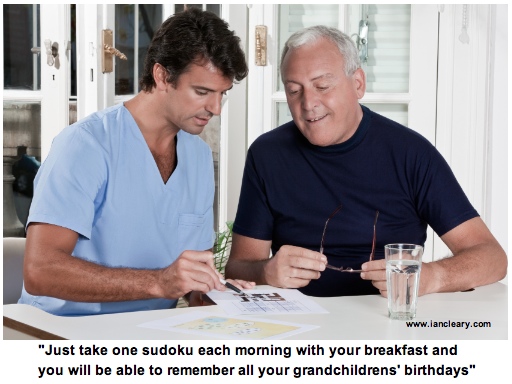Neuroplasticity and the Sudoku myth
You may have heard that maintaining high cognitive function and memory is a simple as doing your daily Sudoku or crossword puzzle thanks to the wonders of Neuroplasticity.
REALLY? Will doing Sudoku really change your brain at all? It turns out that the answer IS yes…. but only because everything does.
However if you think doing Sudoku puzzles will keep your mind sharp into your golden years I am sorry to be the one to break this to you – it won’t.
There will brain changes as you adapt to the new skill, but those changes are specific to putting 9 numbers in boxes. Neuroplasticity is not some magic power that allows one skill to transfer across to another skill – like sharper memory, clearer thinking, general creative ingenuity, remembering where you put your glasses or knowing how to use your new iPhone. You will just be better at Sudoku.
Your brain and body are highly adaptive. The adaption process is geared towards getting better at whatever you are doing. A nice way to sum up the adaption process is from Aristotle but highly relevant today – “We are what we repeatedly do”.
If you want to be more cognitively agile, then do things that require cognitive agility. If you want to move your body faster, stronger longer then start doing it. Getting fit is merely a process of adaptation. Learning a new language is a process of adaptation. The brain does rewire with experience but it is not a generalized change for becoming good at all things. It is very specific. So be specific about what you want to get better at and practice.
Whatever new skill you are learning two key components that can help drive neuroplastic change is NOVELTY & CHALLENGE.
This is highlighted when you track neuroplastic changes in the brain. The time our brain undergoes the most rapid neuroplastic change is at childhood. It’s all new and challenging. So we adapt. Childhood sees us going through incredible brain development.
We used to think that our capacity to change stopped after childhood. It turns out that not only were we wrong but we were embarrassingly wrong. Our brain’s capacity to change stays with us until the day we die. It is just that we mostly get into a groove in life and no longer require adaptation. And so we become very good at what ever it is we are doing – the way we walk, talk, breath, think, feel, perceive.
The second time we go through the most neuroplastic change is if we move to another country that doesn’t speak our language. Your ‘autopilot’ doesn’t work. You have to be present to the current situation and do new and novel things. Our brain’s adapts.
One of the many findings with NP is that the brain does get stuck responding habitually in ways that are not useful (pain, sensitivity, emotions, thoughts, physiological responses, perception etc). This is the dark side of NEUROPLASTICITY. The NEUROPLASTICITY paradox also shows that while our brains are incredible flexible we can get stuck in a rut.
But to get out of a rut and radically change, you don’t have to go and live in a foreign country. You can learn the skills to engage in NP change consciously. There are so many wonderful techniques now that help facilitate NP change to improve people’s lives. There are the targeted interventions to solve a specific problem but this knowledge can be useful in general.
As you begin the process of learning something new, you will hit obstacles. This is where Aristotle’s saying also applies – We are what we repeatedly do. Do you repeated persevere? Perseverance is a habit.
Are you wiring your brain for perseverance or giving up too soon? Learning perseverance and resilience are valuable skills for conscious learning.
So for general health forget Sudoku – Eat well, sleep well, relax well and get out and start challenging your body and mind in new and novel ways.
Get out and socialise. Not just with the people you know. Meet new people. Don’t just walk – walk new places with new people. Socialising is a whole brain activity and can stretch us in wonderful ways. Move your body in new ways. Are you adapting to movement or adapting to being sedentary?
These issues have implications for care into old age and chronic illness. We know lack of socialising and lack of mobility can decrease our health and creates a downwards spiral. So move your body and move your mind in new and novel ways that challenge and stretch you.
We are what we repeatedly do so think about what you want. Be challenged and make it different. We have a wonderfully adaptive brain and body.
Use them both to achieve the life you love and forget Sudoku unless you want to be good at Sudoku.

